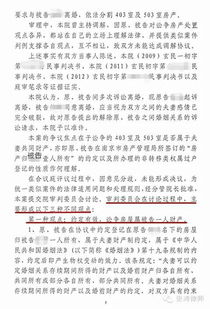离婚管辖地可以在房产所在地
Title: Understanding Jurisdiction in Property Division Cases in Divorce Proceedings
In divorce proceedings, property division can often be a contentious issue, especially when it comes to determining jurisdiction. Jurisdiction refers to the authority of a court to hear and decide a case. When it comes to dividing property in a divorce, jurisdiction plays a crucial role in determining which court has the power to make decisions regarding the distribution of assets. Let's delve deeper into understanding jurisdiction in property division cases in divorce proceedings.
Understanding Jurisdiction in Divorce Cases
1.
Subject Matter Jurisdiction:
Subject matter jurisdiction refers to the authority of a court to hear cases of a particular type or subject matter. In the context of divorce proceedings, subject matter jurisdiction typically involves family law matters, including property division.
Different jurisdictions may have specific laws and regulations governing property division in divorce cases. These laws can vary significantly from one jurisdiction to another.
2. Personal Jurisdiction:
Personal jurisdiction refers to the court's authority over the parties involved in the case. In the context of divorce proceedings, personal jurisdiction typically involves the residency or domicile of the spouses.
Courts typically have personal jurisdiction over individuals who are residents of the state or have significant connections to the jurisdiction, such as owning property or conducting business within the state.
Determining Jurisdiction in Property Division Cases
1. Residency Requirements:
Many jurisdictions have residency requirements that must be met before a court can hear a divorce case or make decisions regarding property division.
For example, a spouse may be required to have been a resident of the state for a certain period of time before filing for divorce or seeking property division.

2. Choice of Law:
In cases where spouses have connections to multiple jurisdictions, courts may need to determine which jurisdiction's laws govern the property division.
Courts may consider factors such as the location of the marital home, where the assets are located, and where the parties were married in determining the applicable law.
3. Forum Shopping:
Forum shopping refers to the practice of seeking out a jurisdiction with laws that are favorable to one's case.
Some spouses may attempt to file for divorce in a jurisdiction with more favorable property division laws, especially if there are significant assets at stake.
Practical Considerations and Recommendations
1. Consult with Legal Counsel:
Given the complexities involved in determining jurisdiction and navigating property division in divorce cases, it is crucial for individuals to seek guidance from experienced family law attorneys.
An attorney can provide personalized advice based on the specific circumstances of the case and help navigate the legal complexities involved.
2. Consider Mediation or Collaborative Divorce:
In some cases, mediation or collaborative divorce processes can offer a more amicable and efficient means of resolving property division issues.
These alternative dispute resolution methods allow spouses to work together with the assistance of neutral mediators or collaborative professionals to reach mutually acceptable agreements regarding property division.
3. Be Prepared for Potential Challenges:
Property division cases in divorce proceedings can be emotionally charged and complex, particularly when significant assets are involved.
It's essential for individuals to be prepared for potential challenges and to approach the process with realistic expectations.
In conclusion, understanding jurisdiction in property division cases in divorce proceedings is essential for navigating the complexities of the legal system. By being aware of the factors that determine jurisdiction and seeking guidance from legal professionals, individuals can better position themselves to achieve fair and equitable outcomes in the division of marital assets.











